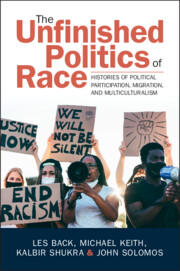 The Unfinished Politics of Race
The Unfinished Politics of Race from Part II - Moments in Time and Place: Rethinking Everyday Politics
Published online by Cambridge University Press: 18 November 2022
This chapter explores the growing significance of religious affiliation in shaping the identity politics of racialised minorities. Specifically, the chapter addresses the growing significance of Islam in shaping both the public reaction to religious diversity andhow the identity politics of Islamic faith reshaped a very different alternative public sphere. The chapter addresses how intersectionalities of diaspora, race, faith, gender, and geopolitics land in place, in the specific history of the East End of London. The chapter describes how diasporic Bangladeshi politics emerges in a transactional relationship with the local state in the East End. But what it means to be British and Bangladeshi, or white and ‘East Ender’, is subject to significant change at the same time. Racialisation and religion combine to shape both white and British Bangladeshi collective identities in nuanced ways. The chapter argues that what was commonly represented as isolation or withdrawal from the mainstream of political participation by a certain fraction of some minority Bangladeshi demographics was nothing of the sort.
To save this book to your Kindle, first ensure no-reply@cambridge.org is added to your Approved Personal Document E-mail List under your Personal Document Settings on the Manage Your Content and Devices page of your Amazon account. Then enter the ‘name’ part of your Kindle email address below. Find out more about saving to your Kindle.
Note you can select to save to either the @free.kindle.com or @kindle.com variations. ‘@free.kindle.com’ emails are free but can only be saved to your device when it is connected to wi-fi. ‘@kindle.com’ emails can be delivered even when you are not connected to wi-fi, but note that service fees apply.
Find out more about the Kindle Personal Document Service.
To save content items to your account, please confirm that you agree to abide by our usage policies. If this is the first time you use this feature, you will be asked to authorise Cambridge Core to connect with your account. Find out more about saving content to Dropbox.
To save content items to your account, please confirm that you agree to abide by our usage policies. If this is the first time you use this feature, you will be asked to authorise Cambridge Core to connect with your account. Find out more about saving content to Google Drive.